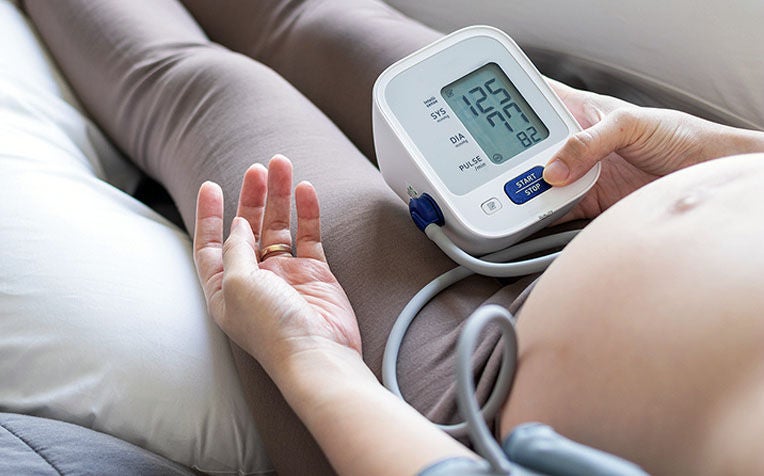
Keeping blood pressure in check during pregnancy is important to avoid preeclampsia, which can cause serious health complications to both mother and baby.
Preeclampsia affects about 4 per cent of pregnancies in Singapore.
If you have pre-existing high blood pressure or gestational high blood pressure, you have a higher risk of developing preeclampsia during pregnancy.
What is preeclampsia?
Preeclampsia is a serious condition that affects multiple organs and can threaten the lives of the mother and her foetus.
Pregnancy-induced high blood pressure or gestational hypertension, without the presence of protein in the urine, can also develop in pregnant women who are older and overweight.
Gestational hypertension, which usually goes away after delivery, can lead to premature delivery and very low-weight babies.
“A complex condition, preeclampsia typically starts after the 20th week of pregnancy. The symptoms can be treated but the only “cure” for preeclampsia is delivery, which can be before term if the disease is serious. The mother’s blood pressure can be expected to return to normal within a few weeks of delivery,” explains the Department of Obstetrics & Gynaecology from Singapore General Hospital (SGH), a member of the SingHealth group.
How to lower risk of preeclampsia
1.
Preconception screening is encouraged so that health conditions such as diabetes, high blood pressure (also known as
hypertension) or
weight issues can be flagged out.
2. Expectant mothers are encouraged to maintain healthy and active lifestyle to prevent elevated blood pressure. This includes:
Having a healthy diet to maintain a healthy weight.
While the amount of weight gain differs based on pre-pregnancy weight, pregnant women are encouraged to have a BMI of between 18 and 23kg/m2. In general, healthy eating can optimise pregnancy outcomes and assist with the overall growth and development of the fetus.
To know what is a healthy weight during pregnancy, check out this article!
A healthy balanced diet consists of a diet rich in whole grains, fresh fruit and vegetables, lean protein, healthier vegetable oils and low-fat dairy products.In addition, avoid foods high in saturated and trans-fat, fatty cuts of meat, full-fat dairy, baked products, and sugar-sweetened beverages.
Intake of essential nutrients is encouraged during pregnancy. Hence, pregnant women should include healthy foods high in folate, iron, calcium, and vitamin B12 in their diet as they will support their health and baby’s development and growth.Doing 150 minutes of moderate-intensity exercise per week.
The Health Promotion Board recommends for pregnant women to reduce the intensity of activity and avoid contact sports or exercises with fall risk.
Light cardiovascular exercises such as walks, runs and swims which help take pressure off joints are encouraged.
According to the Singapore Physical Activity Guidelines, exercising before and during pregnancy is associated with a reduced risk of gestational diabetes, weight gain and a lowered risk of premature birth.
3.
Get adequate sleep of 6 to 8 hours a day to manage stress levels, a contributing factor to high blood pressure.
Signs and symptoms of preeclampsia
High blood pressure
Protein in the mother’s urine (proteinuria)
A persistent headache
Vision changes
Intense pain or tenderness in the upper abdomen
Nausea and vomiting
At times, swelling, especially in the legs and feet, known as oedema may accompany preeclampsia.
Oedema on its own is very common even in uncomplicated pregnancies. However, the oedema may be even more marked in cases of preeclampsia. This occurs when changes in blood vessels cause the capillaries to “leak” fluid into your tissues.
Potential complications of preeclampsia
In mild cases, both mother and baby may continue to be fine. However, in moderate to severe cases, the following health problems may arise:
Reduced blood flow to the placenta: When there is less blood flow to the uterus, there is a reduced supply of oxygen and nutrients to the foetus. This can lead to problems such as low birth weight and poor growth. If there is a need to deliver early to protect the mother's health, the baby may suffer from the effects of prematurity.
Placental abruption: This condition occurs when the placenta prematurely separates from the uterus, this can deprive the baby of oxygen and cause heavy bleeding in the mother.
Eclampsia (or seizures): These can be preceded by symptoms such as severe or persistent headaches, vision changes, upper abdominal pain or mental confusion. When these happen, anti-seizure medications such as magnesium sulphate have to be prescribed.
It is only by delivering the baby that the mother can eventually recover from preeclampsia.
Your doctor will be able to perform the necessary tests to detect the presence of these complications and determine the baby’s well-being, as well as advise you on the appropriate course of treatment to be undertaken.
Risk of premature birth
The only cure for preeclampsia is to deliver the patient.
If preeclampsia occurs after 37 weeks of pregnancy, the doctor will usually advise a planned delivery, either by induction of labour or caesarean section if there are other reasons for this.
However, if preeclampsia occurs before the baby is fully mature (before 37 weeks of pregnancy), there is a risk that the baby has to be born prematurely.
In this situation, depending on the severity of the preeclampsia, the gestational age of the pregnancy, and the conditions of the mother and baby, the doctor will first try to manage the condition for as long as is possible.
“This premature delivery is more usually done by caesarean section and the baby may need to stay in a neonatal intensive care,” explains Dr Tan. Once the baby’s growth and condition are stable, you will be able to bring your baby home.
Gestational high blood pressure is one of the risk factors for pre-eclampsia. Learn more about hypertension during pregnancy on the previous page.
Ref: S13
Related articles:
40 Week Pregnancy Guide by KK Women's and Children's Hospital (KKH)
How to Exercise Safely During Pregnancy
Screening During Pregnancy: What To Know For All Trimesters
Depression During Pregnancy: Tips To Cope
Contributed by


















 Get it on Google Play
Get it on Google Play